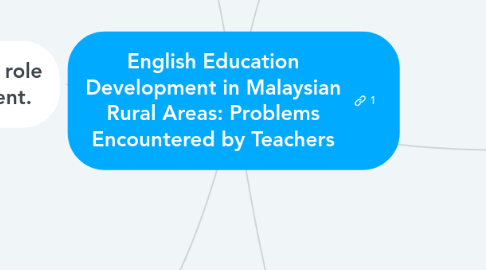English Education Development in Malaysian Rural Areas: Problems Encountered by Teachers
by hani hassan

1. People’s expectations on teacher’s centeredness
1.1. A totalitarian concept of control in which the teacher has the entire control over everything that happens in the classroom, the teacher is the provider of all information, the teacher is there to impart knowledge, and the students are merely there to receive it (Kamarul & Izzaham, 2008).
2. Absence of teacher’s role in literacy development.
2.1. In the same vein, they found it essential that teachers of English should create an interesting and fun learning environment that can engage students cognitively and affectively in the process of learning the English language (Abdul Rahim & Lee, 2017)
3. Lack of the latest educational resources.
3.1. Teachers were found to be using fairly conventional teaching approaches as the result of the lack of high-quality technological resources that the Ministry of Education should supply for each educational level in these rural institutions. (Wreikat et al., 2014)
3.2. Rural teachers have been observed to lack quality technological sources in schools, forcing them to teach in accordance with traditional methods that are unable to keep up with the massive worldwide educational development (Wreikat et al., 2014)
4. Ineffectiveness classroom activities.
4.1. The quality of interactions that impact on their development also rests on the quality of the teachers and their ability to enhance diverse learners’ capacity to learn (Abdul Rahim, 2007; Sammons et al. 2016)
4.2. They tended to resort to the traditional method of teaching using paper, pencil and workbook (Abdul Rahim & Lee, 2017)
5. Inadequacy of teacher’s professional local knowledge.
5.1. According to the preliminary report of the Malaysia Education Blueprint 2013-2025, the result for the primary school public examinations indicates the gap between urban and rural students is almost 4 percentage points in favour of urban schools ( Jamil et al., 2017)
6. The covert struggles to develop strong learning motivations in students
6.1. Students who lack self-motivation and effort to speak in English, preferring instead to converse in their native languages to obtain effective communication (Ler, 2012).
6.2. The convenience with which one's first language is utilised discourages one from using English, which is only spoken infrequently(Ler, 2012).
6.3. Rural students are also affected by their friends' narrow-mindedness and timidity, which is common among those with minimal exposure (Ler,2012).
6.4. Motivation is also an excellent indicator of success while learning a second language (Ler, 2012).


